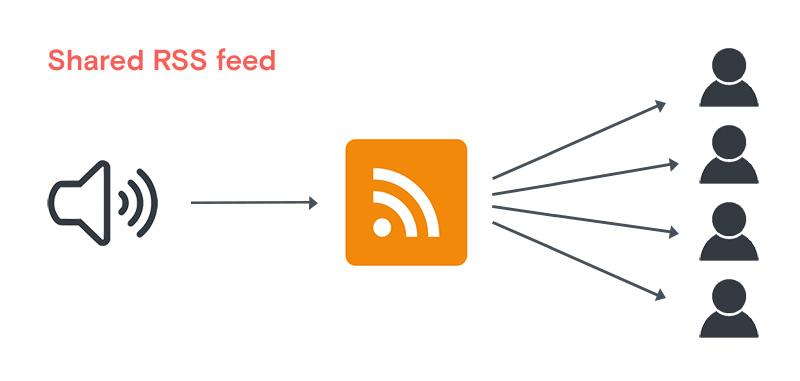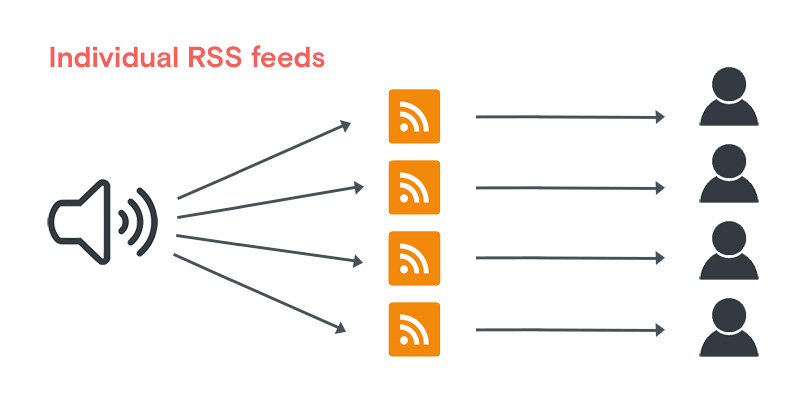Shutterstock
What’s a Private RSS Feed and How Do I Create One?
As a podcaster, it helps to know how a private RSS feed works, how to create one, and how your listeners can access it.
Prefer to listen to this blog post? Get the audio version delivered to your podcast player by subscribing to Supercasters Premium—it's free!
As a podcaster with a subscription program, it helps to know a little bit about RSS, the technology that underpins both public and private podcast distribution.
What’s an RSS feed?
RSS stands for Really Simple Syndication and the name is essentially the definition too. An RSS feed is a simple computer file that syndicates or sends out content in real-time to any application that’s set up to read it.
You can distribute any kind of content through an RSS feed, from blog posts and news articles to podcasts and videos. Use of RSS for written content has declined a lot in the last decade, but it’s still the primary way that podcasts are distributed.
The RSS feed for your podcast is created by your podcast host. You’re then given a URL where the feed lives. Once you point podcast players and directories to the URL, they’ll check your feed and update the content on their platform anytime they find something new.
You can manually create your own RSS feed, but then you still need to store and distribute the audio files somehow. Using a podcast host for all this work is exactly why podcast hosts exist, and it’s the best choice for all but a handful of hardcore geeks who are committed to a full DIY approach.
Despite the ubiquity of RSS feeds in podcasting, most listeners are unaware it’s the technology podcast players use to keep show libraries up to date with the latest episodes. This is important to keep in mind when we talk later about private feeds.
What’s a private RSS feed?
A private RSS feed is simply an RSS feed that’s not made public. There are two ways you can set up private feeds:
A single private feed that all opted-in listeners share

A single private feed can be useful in some instances. For example, I once embedded a private episode on a landing page for people who had entered a contest. Everyone who reached the landing page by entering an email address was able to play the audio but the episode didn’t appear in my public feed for everyone to hear.
I didn’t need to know who was listening to the private audio and I didn’t particularly care if the private link was shared.
Individual private feeds per opted-in listener

Individual private feeds per listener are the way to go if you want better visibility, control, and security of your content. Each listener gets a unique feed link, so you can see who listens to what content, as well as who might be sharing their feed with others.
How do I create a private RSS feed?
Some podcast hosts can create a single private RSS feed for a piece of content just like they do for your show’s entire public feed.
But if you want to create individual private feeds per listener, Supercast is one of the only platforms that has this capability. (Patreon doesn’t do it, for example.)
With Supercast, all you need to do is upload the private content you want to share with paid subscribers. We create and manage the personalized feeds for you.
Just as with public RSS feeds, there are ways to create private RSS feeds on your own if you’re comfortable with some coding. But again, this isn’t a workable solution for most podcasters and still leaves the issue of how you’ll host and distribute the files you create. (Not to mention having to manually repeat this process over and over to create individual feeds for each of your subscribers and then keep track of them somehow.)
How can my listeners access a private RSS feed?
Your listeners can access a private RSS feed in any podcast player that supports RSS —which is virtually all of them.
Here are 19 podcast players that support private RSS feeds:
- Airr
- Apple Podcasts
- Castro
- Castbox
- Downcast
- Google Podcasts
- Momento
- Moon FM
- OverCast
- Player FM
- Pocket Casts
- Podcast Addict
- PodcastGuru
- Podcast Republic
- Podcasts Tracker
- PodKicker
- Podverse
- RadioPublic
- RSSRadio
There are two notable absences from this list: Stitcher and Spotify don’t use or support RSS.
That said, your listeners can still access your private feed in Spotify if you use Supercast, thanks to an integration we’ve built.
As for how listeners actually get the private feed into their podcast player, there are two main ways:
- They can click Add Feed in their podcast player and manually paste in the URL for their private feed.
- They can be connected to their private feed with a single screen tap, if the feed comes from Supercast.

The second method is fastest and easiest for listeners, and results in more listeners successfully connecting to their paid content.
Automatic connection also means you get fewer support requests from people struggling to figure out what an RSS feed is and what to do with it. Remember, most listeners don’t know—or really care—that RSS technology underpins their podcast listening.
How do I prevent people from sharing my private RSS feed?
Feed fraud—people sharing their private feed with others—can be a problem. If subscribers are sharing their subscription broadly, you’re losing revenue.
There’s no built-in security on an RSS feed, either public or private. RSS feeds are open, unencrypted XML files that can be read by any platform that supports RSS.
The way you manage security is to ensure only people who are authorized to have the private feed have the link.
Well, how do you do that? Surely anyone can share a link? Yes, they can. That means you need a way to track if a link is being shared.
As we discussed, one of the advantages of having individual private RSS feeds is that you can track how each one is being used. You can see if David has suddenly accessed his private feed from five cities in two days, or on 12 different devices.
On your Supercast dashboard, we alert you to this kind of suspicious behavior so you can warn offenders and even suspend abused feeds without affecting any of your other subscribers.
And that in a nutshell is RSS for subscription podcasters. To explore feed security and other Supercast features, open your free account here.


